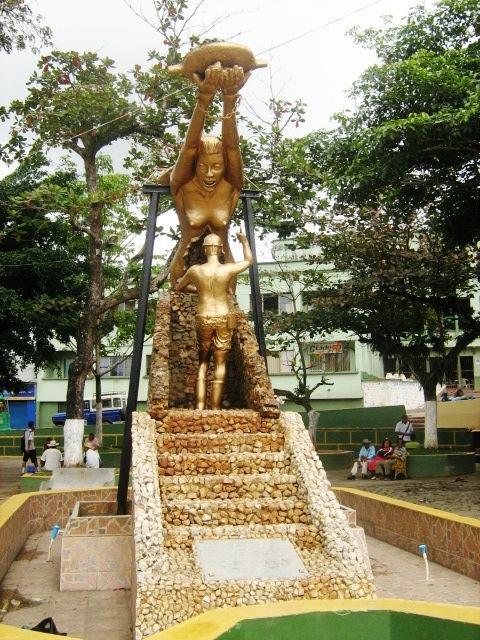Segovia, Antioquia, Colombia
Suggest Place to Visit
1572
Track to location with GPS |
 |
Segovia was discovered by Captain Francisco Nuñez Pedrozo. There are no exact figures for when the population center began to be formed, what is known is that on July 24, 1869 it was elevated to the category of fraction. Before the arrival of the settlers, the Segovian territory was populated by the Tahamí and Yamecí Indians. In the 1860s, the explorers arrived in Segovia, and having found gold mines they stayed in order not to leave. From that moment on, there were many expeditions that arrived in Segovia in search of the precious metal. The gold rush captured the attention of all who arrived. Until that moment, Segovia was nothing more than a simple village of the municipality of Remedios.
In 1852 the Frontino Gold Mines was established in Segovia, which brought steam engines, telegraph, mail and Californian mill and also installed rails in the mines, thus bringing better management of mining.
In 1865 the parish was built as part of the Archdiocese of Santa Fe de Antioquia. In 1877 it became a town and the name of Tierradentro was changed to the current one of Segovia. In 1880 Segovia was erected as a district. A year later, that district had been added back to the municipality of Remedios. In 1885, Segovia managed to get the president of Antioquia to erect it as a municipality, thus separating itself from Remedios.
It is a municipality with a warm climate where many cultures converge, since throughout its history it has received people from all over the country who arrive attracted by the possibility of working in gold mining.
It is a mining territory par excellence. Gold has been its main reference since before the arrival of the Spanish and even today its economy and culture revolves around the mines.
Segovia is a municipality of Colombia, located in the Northeast subregion of the department of Antioquia. It limits to the north with the municipalities of Zaragoza and El Bagre, to the east with the department of Bolívar, to the south with the municipality of Remedios, and to the west with the municipalities of Amalfi and Anorí.
Appellatives: Town forged in Gold, Golden Gate of Northeast Antioquia and Gold Capital of Colombia.
It received its name to emulate the names of Spanish cities and conquerors. It has also been called Tierradentro.
It has 1 township, Fraguas (Machuca), and 29 villages, including Campo Alegre, El Aporriado, Laureles, San Miguel, La Po, El Cenizo and Puerto Calavera.
It has an area of 1,231 km².
Demography
Total Population: 37,154 inhab. (2009)
Urban Population: 30,266
Rural Population: 6,888
Communication channels
It is connected by road with the municipalities of Zaragoza and Remedios.
Geography
The municipality of Segovia is located in the central mountain range of the Andes, in northeastern Antioquia, and enjoys a hot climate.
Economy
Agriculture: banana and coffee.
Livestock in general
Commerce
Woods
Mining: Gold and silver. Mining is the municipality's main source of foreign exchange.
The company ´´Frontino Gold Mines´´ was born here in 1852 by US investors who, given the gold wealth, settled in the town formerly called Tierradentro. Thanks to its gold wealth, it is one of the municipalities of Antioquia that exports the most gold.
Parties
Pocuné River Festivities (Fraguas Corregimiento), 2nd. week of march
Segovian Identity Day, 2nd. June week
Mining Festival and the Virgen del Carmen, 3rd. July week with the participation of the different mining associations, where mining and the Virgen del Carmen are highlighted as the patron saint of drivers and miners.
It is a festival full of artistic beauty and where the gold wealth is exalted.
Historical artistic heritage and ecological destinations
Parque Principal de Los Próceres, with the busts of Rafael Uribe Uribe, Benjamín Herrera and Enrique Olaya Herrera
Our Lady of Los Dolores Parish (Main Park), El Santo Cristo (Briceño), Our Lady of Carmen Parish (Galán Neighborhood) Reconstruction of the old church of the Municipality destroyed by an earthquake in the 1960s
Ecological and country destinations:
El Silencio and Providencia Mines. Here you learn about the exploitation of gold. ´´El Silencio´´ is the largest gold mine in the Northeast. It is a kind of underground city with 44 levels, that is, a building from 44 floors down, where men work at temperatures of 36 degrees Celsius
The crystallines. Place with ideal places for bathing, walks and ecological walks. Their businesses offer drinks such as ´´crystalline´´, ´´dark´´ or lemonade. It also has impressive landscapes due to its degree of beauty, in short it is one of the most beautiful places in Segovia.
El Manzanillo Dam - La Tupia. The beautiful landscapes contrast with the spa, where bathers come especially on weekends
Charco de Las Brujas. The natural pools are attractive to tourists and residents of Segovia, and the Charco de Las Brujas is one of the main ones. The great variety of vegetation and the diverse landscapes that are enjoyed while walking towards it attracts there.
Comments
We don´t have yet any comments about:
Segovia
Segovia
Be the first to leave a comment as it is very important to inform other people
Outros locais a visitar
Within a radius of 20 km from:Segovia
Unfortunately we do not have information on other places to visit in this area yet
Hotel reservation near Segovia within a radius of 20 km
No results
Why to book with CLUBE TRAVEL
The best prices
Our partnerships with the world´s largest operators offer research on the best market prices.
More options
At Rotas Turisticos you can book the hotel, buy the air ticket, book the transfer from the airport to the hotel and vice versa, book the local excursions, rent the car, take travel insurance and consult the places to visit and where to go.
Holiday Tips & Destinations
Hundreds of holiday destinations with all the options that allow you to easily choose the destination that best suits your dream vacation.
CLUBE TRAVEL
Links





